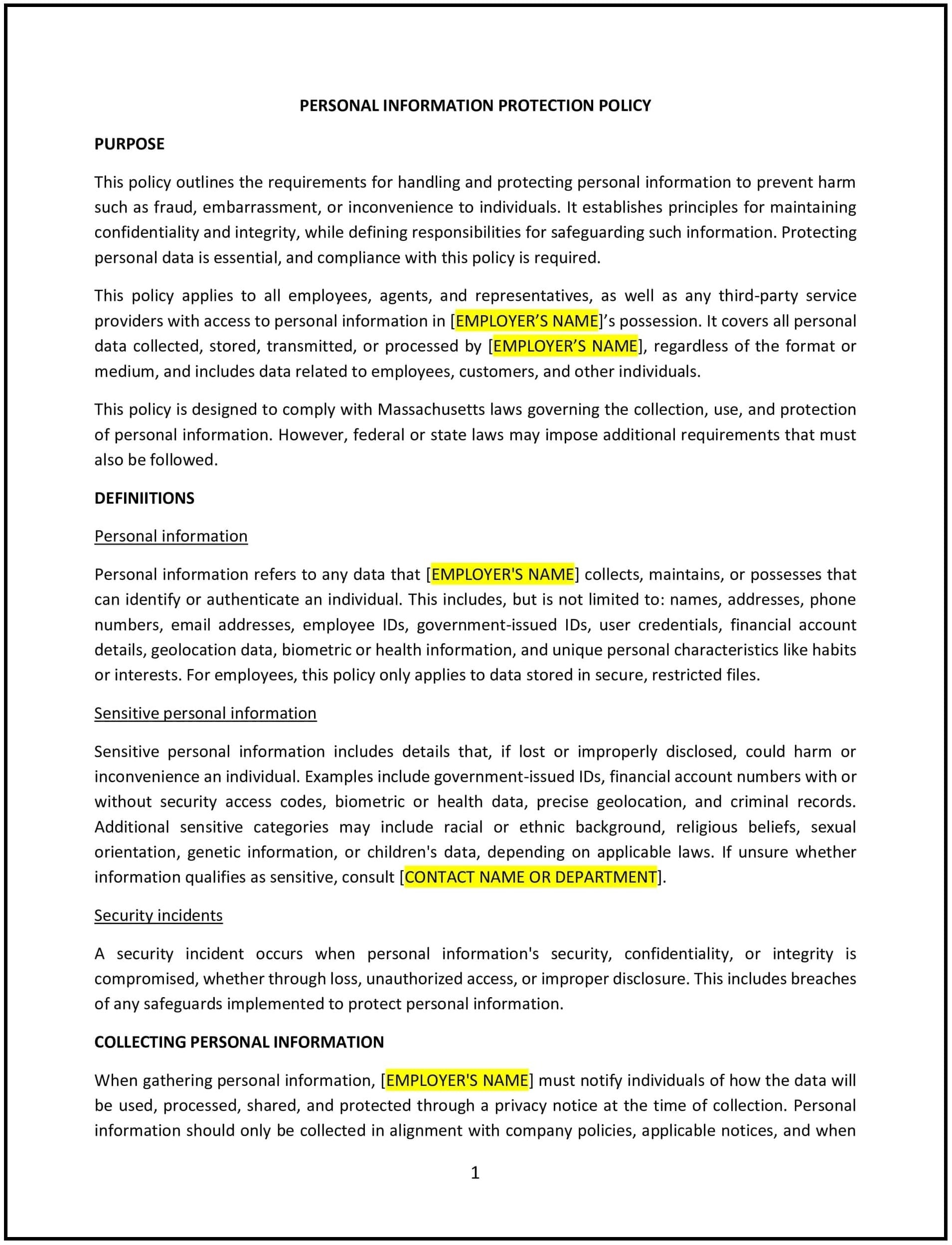Personal information protection policy (Massachusetts): Free template
Got contracts to review? While you're here for policies, let Cobrief make contract review effortless—start your free review now.

Customize this template for free
This personal information protection policy is designed to help Massachusetts businesses safeguard the personal information of employees, customers, and other stakeholders. The policy outlines the company’s approach to collecting, storing, processing, and disposing of personal data, ensuring that it is done securely and in compliance with Massachusetts state laws, federal regulations, and industry best practices.
By adopting this policy, businesses can protect sensitive personal information, maintain trust with employees and customers, and help achieve compliance with privacy laws, including the Massachusetts Data Privacy Law and the General Data Protection Regulation (GDPR) if applicable.
How to use this personal information protection policy (Massachusetts)
- Define personal information: Clearly define what constitutes personal information under the policy. This may include any data that can be used to identify an individual, such as names, addresses, phone numbers, Social Security numbers, financial information, and health records. The policy should also specify any sensitive data categories that require additional protection.
- Establish data collection guidelines: Outline how personal information will be collected, including the types of data that will be gathered and the purpose for which it will be used. Employees and customers should be informed about the reasons for data collection and how their data will be used.
- Outline data storage and access protocols: Specify how personal information will be stored and secured to prevent unauthorized access. This may include using encrypted storage systems, restricting access to authorized personnel, and maintaining physical and digital security measures to protect the data.
- Implement data sharing and third-party access controls: Specify the conditions under which personal information may be shared with third parties, including vendors, contractors, or service providers. The policy should require that third parties handling personal data comply with the company’s data protection standards and privacy laws.
- Address data retention and disposal: Define how long personal information will be retained and the procedures for securely disposing of it when it is no longer needed. This may include deleting or anonymizing data after a certain period or when it is no longer relevant to business operations.
- Ensure compliance with Massachusetts and federal laws: Ensure that the policy complies with Massachusetts state laws, such as the Massachusetts Data Privacy Law, and federal regulations like the Health Insurance Portability and Accountability Act (HIPAA) or the Gramm-Leach-Bliley Act (GLBA) for businesses in regulated industries. It should also address any global privacy laws, such as GDPR, if applicable.
- Review and update regularly: Periodically review and update the policy to ensure it remains aligned with changes in Massachusetts state laws, federal regulations, and industry best practices for personal information protection.
Benefits of using this personal information protection policy (Massachusetts)
This policy offers several benefits for Massachusetts businesses:
- Promotes compliance with privacy laws: By establishing clear guidelines for personal information protection, businesses can promote compliance with Massachusetts state laws, federal regulations, and international privacy standards, reducing the risk of legal penalties.
- Enhances customer and employee trust: By protecting sensitive personal data, businesses build trust with customers, employees, and other stakeholders, showing that their privacy is respected and that the company takes data protection seriously.
- Reduces the risk of data breaches: The policy helps minimize the risk of unauthorized access to personal information by implementing strong security measures, data encryption, and access controls.
- Improves risk management: By identifying and managing risks associated with personal data collection, storage, and processing, businesses can prevent costly data breaches and mitigate potential financial and reputational damage.
- Supports organizational transparency: A well-structured data protection policy ensures that employees and customers understand how their personal data is being handled, fostering a culture of transparency and accountability within the organization.
- Promotes data minimization: By outlining clear data retention guidelines, the policy helps ensure that personal information is only kept as long as necessary, minimizing the volume of sensitive data held by the company.
Tips for using this personal information protection policy (Massachusetts)
- Communicate the policy clearly: Ensure that all employees and relevant stakeholders are aware of the personal information protection policy and understand how their personal data will be handled. Include the policy in the employee handbook and provide training on data protection best practices.
- Provide training for employees: Offer regular training on the importance of personal information protection, including how employees should handle and safeguard sensitive data in their day-to-day work. This will help achieve compliance and reduce the risk of accidental data breaches.
- Implement data access controls: Restrict access to personal information to only those employees who need it to perform their job functions. Use role-based access controls and strong authentication methods to prevent unauthorized access.
- Regularly audit data protection practices: Conduct regular audits of your data protection practices to ensure that personal information is being handled securely and in compliance with the policy. Audits can help identify areas for improvement and reduce the risk of data breaches.
- Be transparent about data collection and usage: Clearly communicate with customers and employees about what personal data is being collected, how it will be used, and the steps taken to protect it. This transparency fosters trust and helps maintain a positive relationship with stakeholders.
- Review and update regularly: Periodically review the policy to ensure it is compliant with Massachusetts state laws, federal regulations, and changes in business operations. Update the policy as needed to address emerging data protection threats and best practices.